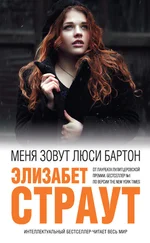—
But in his memory, now, he thought of Betsy, her quiet prettiness, her simplicity of self, yet she was not simple at all. She had, without blinking an eye, accepted the fact that Cassie was a lesbian, she had had an affair (oh, Betsy!)—no, there was nothing simple about Betsy. And on this night, he wished she was alive and with him. And this baffled him and yet did not. It baffled him because of their whole life squandered—only not really their whole lives, they had had many laughs, many sweet moments, and these came to him fleetingly tonight. He pictured how he made crêpes on the weekends, and they, all three of them—Betsy and Cassie and himself—ate them at the kitchen table; in his mind, they were laughing. He pictured his wife later, as she came to bed, her face lowered, but then the sudden open smile she might give him, and his heart felt a horrifying rush then, because he really had loved her in his way, and she was gone. But they had still squandered what they had, because they had not known.
When he thought of Betsy’s affair with that Tom Groger he did not know what to think. But it had obviously begun way before his own. And sitting in his chair now, looking out over the dark, dark night, so dark he was not even able to see the trees and the field, he tucked his elbows into his stomach and said out loud, quietly, “Oh, Betsy, I wish you had not done that, I wish you had not done that!”
But Betsy was dead. And he was not.
Jack almost slept downstairs. But in the end he climbed the stairs and got into the bed next to Olive; he had no idea if she was awake or not.
That night he dreamed of Betsy and Cassie: His child was young, and she was holding her mother’s hand, their backs were to him. But then they turned and waved at him, and he felt joy— joy— and he walked to them quickly, but then it was only Cassie, and then even she disappeared, and in the dream Jack found himself on a large, large rock; it curved downward as though it was the earth itself, or the moon—because it felt that isolated—and he was alone on this rock and the panic he felt was estimable. He woke, crying out, and even then he did not know where he was.
Olive spoke his name, “Jack,” she said, she was sitting up in bed. When he said, “Olive, I don’t know where I am!,” she said, calmly, “Okay, Jack, come with me,” and she walked him through the house, she took him downstairs into the living room to show him the house he lived in, and even with her showing him this he was deeply confused and frightened, even as he heard Olive’s voice speak to him—“Jack, this is your home, this is the living room, and now we’re back in the bedroom”—even as he heard this, he understood that he was alone with his nighttime dream.
As people always are, with these things.
Jim and Helen Burgess flew from New York City to Maine in July with their eldest grandson, Ernie—he was seven years old—to take him to summer camp. They rented a car in Portland, and after dropping the boy off Helen wept a little bit in the car and kept telling Jim she thought the boy was too young to be going away for a month, and Jim said the kid would be all right. They were now on their way to Crosby, where Jim’s brother, Bob, lived with his second wife, Margaret. Helen had met Margaret only once before, a number of years ago when Bob brought Margaret to New York, and Helen had been aware—it was hard to miss—that Margaret had not liked the city at all, she had been afraid—afraid!—and after that, Bob came on his own to New York to visit; he came maybe once a year.
Helen had not been in the state of Maine for almost a decade, and she looked around with interest as they entered the town of Crosby. They had driven along the coast briefly; the spruce trees were standing skinny and straight on the islands, and the water sparkled like crazy, and now they were passing a few white clapboard houses and also brick houses. The sun was bright, and there was a display of some kind taking place on Main Street; there were booths and different people strolling around. “This is really pretty,” she said, and Jim said, Yeah, he guessed it was.
Bob’s house was not difficult to find; it was right off Main Street and was a large old brick house, four stories high. Now it was divided into condos, and as Helen stood on the steps in the afternoon sunshine she felt very glad to be there. But when she saw Margaret she could have just about fallen over; Margaret’s hair—which used to be a streaky blond and piled up sort of messily on her head—was all gray now, and cut right below her ears.
Margaret said “Hello!,” and Helen reached up to kiss her cheek, leaving a lipstick stain, which Helen then tried to rub out with her finger. “Whoopsie,” Helen said, but Margaret said “Oh, don’t worry,” and Helen and Jim followed her up a really steep set of stairs while Margaret was saying that Bob had gone to buy some wine, he’d be back in a minute. The carpet on the stairs was gray, and filthy—Helen was surprised—and then Helen, as she followed Margaret through the door to their apartment, was just as surprised at the place: It was small, only two rooms, a kitchen in one of them, and there was the oddest furniture in that room, a couch right in the kitchen area and two chairs matching, all very old-appearing, and the upholstery had big yellow areas on a red background, and then there was the small living room; apparently their bedroom was upstairs one more flight, there was a stairway in the living room, but Margaret didn’t say and Helen didn’t ask. “What a lovely place,” Helen said as she walked through it, because Jim had said nothing as he shook off his jacket and sat on the couch in the living room. “It’s okay,” said Margaret, and she shrugged, putting her hands forward in a gesture of welcome. “It’s ours.”
Helen thought she would go absolutely batty if she had to live in two rooms like this, although the windows were long, almost to the floor, and the view was quite nice, really, it looked right down on the park where the trees stood with their huge sprays of green leaves and a few children could be seen kicking a ball. “Oh, it’s so cozy,” Helen said, sitting down in a rocking chair whose upholstery had split open.
The door in the kitchen room squeaked, and then there was Bob, walking now into the living room. Jim rose and slapped his brother on the shoulder. “Slob-dog, how are you?” He asked this with an open-faced grin. “Looking good, kid,” Jim said to Bob, and Bob said, “You too,” even though Helen knew that Jim—always in good shape, and always a handsome man—had gained ten pounds during the last year, and she thought it made his eyes seem smallish. “Oh, Bobby,” Helen said, and after kissing him she touched her hand to his cheek. “Hel lo, Bobby,” she said. And Bob said, beaming, “Hello, Helen, welcome to Crosby, Maine.”
“It’s just lovely,” Helen said.
A number of years earlier, Bob Burgess had asked his wife—they had been married for five years at that time; Bob had moved up from New York City, where he had lived his entire adult life—if she would mind if they moved out of the town of Shirley Falls and went and lived in Crosby instead, an hour away, and as soon as he asked her this, he could see that she was crestfallen. He said immediately, “No, never mind,” but she asked him why he wanted to, and he answered her honestly: Shirley Falls just made him too sad. They were sitting in their living room at the time, and the ceiling was low, and the room received little natural light even in late June, which it was at the time of this conversation, and he looked around the room and said, “I’m sorry.”
Читать дальше













